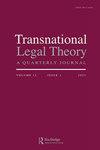关键员工的公正过渡?第二十六届缔约方大会及其后的工作人员和气候政策
Q2 Social Sciences
引用次数: 0
摘要
摘要现在是时候调查如何将必要的工人纳入现有的公正过渡理解中,以及在《联合国气候变化框架公约》(UNFCCC)下关于公正过渡的讨论中是否以及如何解决这些工人的问题了。通过这样做,人们可能会更好地理解关键工人与实现巴黎目标的关系,并评估明确这种联系的切入点。Dimitris Stevis和Romain Felli进行的一项研究得出了公正过渡概念的三种方法,为不同行为者如何理解公正过渡概念提供了有用的参考点。本文扩展了该框架,以考虑在三个方向中的每一个方向下,基本工人如何与公正过渡相关。然后,该文件将该框架应用于决定、报告、声明和提交的材料,这些材料构成了《联合国气候变化框架公约》下关于公正过渡的讨论的书面记录。本文章由计算机程序翻译,如有差异,请以英文原文为准。
A just transition for essential workers? Workers and climate policy at and after COP 26
ABSTRACT It is timely to investigate how essential workers may be incorporated into existing understandings of just transition, and whether and how such workers have been addressed in discussions on just transition under the UN Framework Convention on Climate Change (UNFCCC). In so doing, one might better understand the relationship of essential workers to the achievement of the Paris goals, and assess entry points for making such connections explicit. Three approaches to the concept of just transition, drawn from a study conducted by Dimitris Stevis and Romain Felli, provide a useful reference point for how the concept of a just transition is understood by different actors. This paper extends the framework to consider how, under each of the three orientations, essential workers may be relevant to a just transition. The paper then applies the framework to the corpus of decisions, reports, declarations, and submissions that make up the written record of discussions on just transition taking place under the UNFCCC.
求助全文
通过发布文献求助,成功后即可免费获取论文全文。
去求助
来源期刊

Transnational Legal Theory
Social Sciences-Law
CiteScore
2.10
自引率
0.00%
发文量
7
期刊介绍:
The objective of Transnational Legal Theory is to publish high-quality theoretical scholarship that addresses transnational dimensions of law and legal dimensions of transnational fields and activity. Central to Transnational Legal Theory''s mandate is publication of work that explores whether and how transnational contexts, forces and ideations affect debates within existing traditions or schools of legal thought. Similarly, the journal aspires to encourage scholars debating general theories about law to consider the relevance of transnational contexts and dimensions for their work. With respect to particular jurisprudence, the journal welcomes not only submissions that involve theoretical explorations of fields commonly constructed as transnational in nature (such as commercial law, maritime law, or cyberlaw) but also explorations of transnational aspects of fields less commonly understood in this way (for example, criminal law, family law, company law, tort law, evidence law, and so on). Submissions of work exploring process-oriented approaches to law as transnational (from transjurisdictional litigation to delocalized arbitration to multi-level governance) are also encouraged. Equally central to Transnational Legal Theory''s mandate is theoretical work that explores fresh (or revived) understandings of international law and comparative law ''beyond the state'' (and the interstate). The journal has a special interest in submissions that explore the interfaces, intersections, and mutual embeddedness of public international law, private international law, and comparative law, notably in terms of whether such inter-relationships are reshaping these sub-disciplines in directions that are, in important respects, transnational in nature.
 求助内容:
求助内容: 应助结果提醒方式:
应助结果提醒方式:


